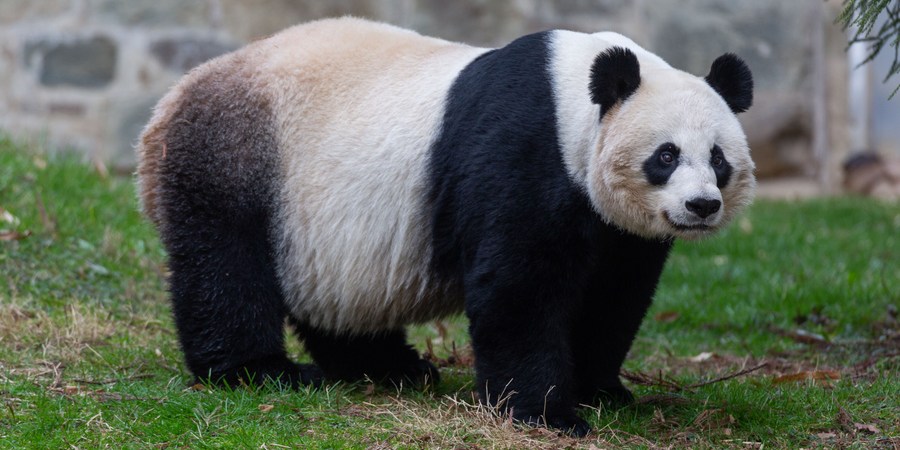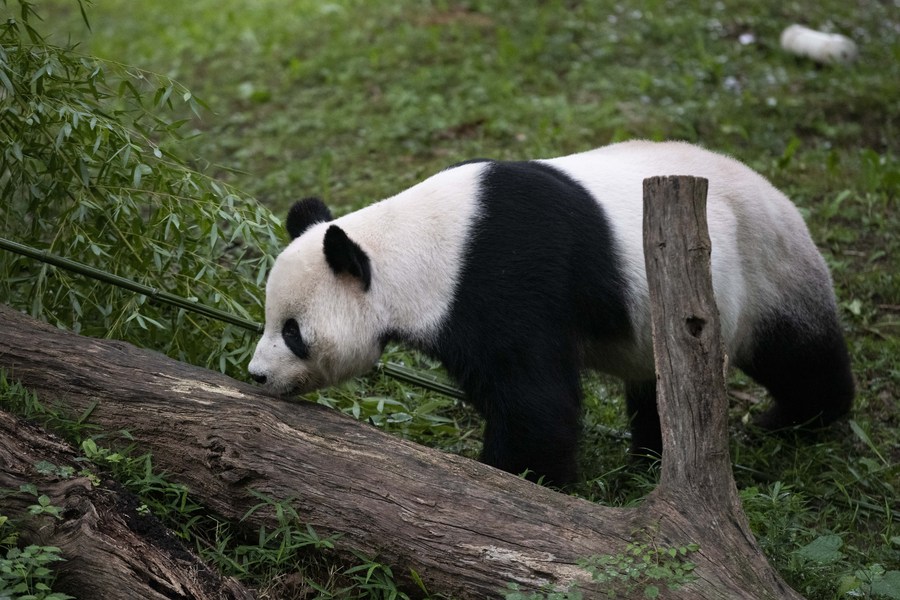Steve Monfort, John and Adrienne Mars Director of the Smithsonian's National Zoo and Conservation Biology Institute, speaks during an interview at the Smithsonian's National Zoo in Washington, D.C., the United States, Aug. 22, 2020.(Xinhua/Liu Jie)
The arrival of the baby panda not only a moment of "pure joy" but also "a success that we should be sharing together because we didn't do this by ourselves,"U.S. national zoo chief said.
WASHINGTON, Aug. 23 (Xinhua) -- Steve Monfort, director of the Smithsonian's National Zoo here, said on Saturday that they are "really proud" of the partnership with China on conserving giant pandas, a day after a "miracle" cub was born at the zoo.
In an interview with Xinhua inside the national zoo's giant panda habitat, Monfort called the arrival of the baby panda not only a moment of "pure joy" but also "a success that we should be sharing together because we didn't do this by ourselves."
 This undated file photo provided by Smithsonian's National Zoo shows giant panda Mei Xiang at the zoo in Washington, D.C., the United States.(Smithsonian's National Zoo via Xinhua)
This undated file photo provided by Smithsonian's National Zoo shows giant panda Mei Xiang at the zoo in Washington, D.C., the United States.(Smithsonian's National Zoo via Xinhua)
Mei Xiang, a 22-year-old giant panda, was artificially inseminated in March this year with frozen semen collected from Tian Tian, the zoo's male giant panda, after signs showed that she was experiencing a normal reproductive cycle.
"We were able to execute this in a very narrow window of time," Monfort said. Female giant pandas are only in estrus, or able to become pregnant, for 24 to 72 hours each year.
Veterinarians confirmed evidence of a fetus on an ultrasound earlier this month, which was a surprise even for professionals, considering a very low fertility rate for giant pandas and, particularly, Mei Xiang's age.
 Giant panda Tian Tian is seen at the Smithsonian's National Zoo in Washington, D.C., the United States, Aug. 22, 2020. Mei Xiang was artificially inseminated in March this year with frozen semen collected from Tian Tian.(Xinhua/Liu Jie)
Giant panda Tian Tian is seen at the Smithsonian's National Zoo in Washington, D.C., the United States, Aug. 22, 2020. Mei Xiang was artificially inseminated in March this year with frozen semen collected from Tian Tian.(Xinhua/Liu Jie)
The female gave birth to the cub Friday evening, making history by becoming the oldest giant panda living in the United States to do that, a "miracle" due to a decades-long partnership across the Pacific on the unique species, which has lifted many people's spirits amid the COVID-19 pandemic.
"The miracle really is after almost 50 years of building up knowledge about science, of animal care and nutrition and behavior and reproduction. We know exactly what to do," said the zoo chief, stressing that the zoo communicates regularly every month with colleagues in China and that he is grateful for "all of their knowledge and their generosity of sharing that knowledge with us."
"We provide updates on the status of the pandas and we're in close communication," the director said. "With any help that we need, we know that our Chinese colleagues are there to give us advice."
"We're really proud of the partnership that we have with our Chinese colleagues. We're at 48 years now of working with China with giant pandas ... it's been a huge success," he noted.
The zoo's current cooperative breeding agreement with the China Wildlife Conservation Association will expire later this year. Monfort said the two sides have had "very productive discussions."
 Giant panda Tian Tian is seen at the Smithsonian's National Zoo in Washington, D.C., the United States, Aug. 22, 2020.(Xinhua/Liu Jie)
Giant panda Tian Tian is seen at the Smithsonian's National Zoo in Washington, D.C., the United States, Aug. 22, 2020.(Xinhua/Liu Jie)
"We're going to come up with a really good agreement pretty soon. I think this birth maybe was a little bit of a surprise for both of us," he said. "We're hopeful. We're going to have an agreement."
The zoo, located in northwest Washington, D.C., reported that Mei Xiang and her newborn had a successful first night. Between bouts of good rest, Mei Xiang appeared to nurse her cub and was very attentive to its vocalizations.
"Right now, we think everything's going very well. We've heard vocalizations overnight from the cub, which suggests that it's strong. And we've noticed the positioning of the cub on the mother's chest, which suggests that she's nursing," Monfort said. "So everything is going very well so far."
According to the zoo chief, Mei Xiang, whose three cubs have survived to adulthood, is "a great mom" and that "she's providing all the right kinds of care."
"Once this miracle happens and the baby is born, really mom takes over," he said. "We expect ... she's really got experience already and she'll be just great. So we probably will just sit back and relax and look and wait for her to signal to us when she's needing anything."
Keepers and scientists have not been able to get hands on the new cub because they want to wait until Mei Xiang is ready to leave it for more food, which usually takes place within a week or so.
"It's really difficult to even see this tiny little cub right now, but when we do the physical exam, we will be able to identify the sex at that time. So for right now, we just know what appears to be a healthy cub. Just couldn't be happier," Monfort said.
If the new cub survives, the zoo will likely follow its tradition of holding a naming ceremony at its 100 days since birth.
"We need to give mom and the cub time to be alone and to have the cub grow and become strong. We'll do a physical examination after a couple of weeks. Perhaps at 100 days, hopefully, we'll have a naming ceremony and it'll be another joyous occasion," he added.
 简体中文
简体中文





